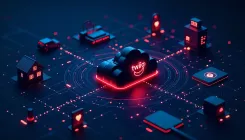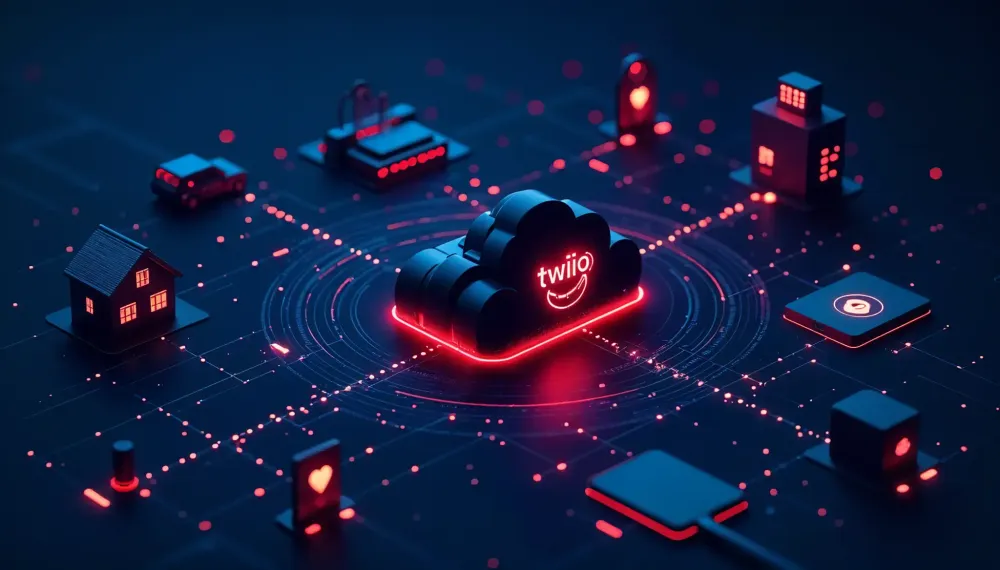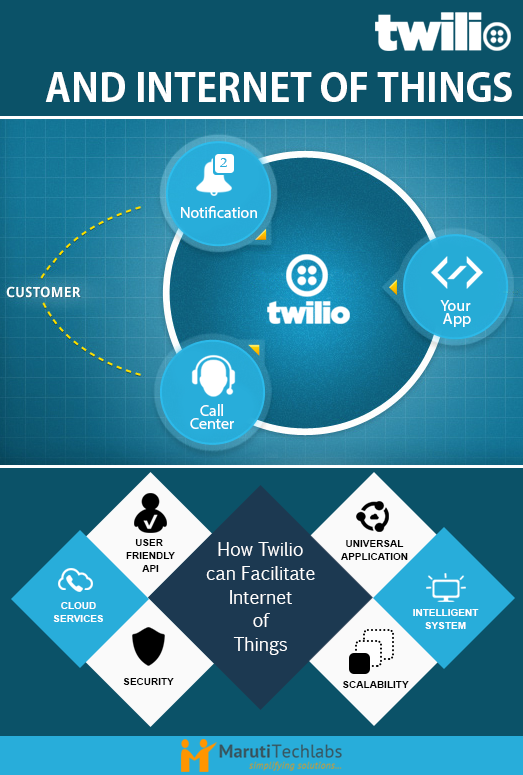

How Twilio Enables IoT Connectivity: 6 Reasons Why It Matters






Imagine all your home appliances connected in such a way that they could communicate among themselves to complete and notify the daily tasks. Such a scenario is possible using Internet of Things (IoT) facilitated by Twilio. With IoT, devices can talk to each other and things can be done with almost no human intervention though we still need to be notified/alerted in order to monitor the work status. Twilio helps in the integration of alerts via Text, Voice calls etc. Twilio is a Cloud Communication platform which enables software developers to embed voice, message, and video directly into applications using web services APIs. It offers highest quality calls and most reliable messaging service. Twilio has recently acquired ‘Authy’ to accelerate strong authentication and identity adoption for the Web and Mobile Apps. With Authy, Twilio now provides a cloud-based API to seamlessly embed two-factor authentication (2FA) and phone verification into any application. Twilio also launched IP Messaging, New Conference Call Services, and High-Volume SMS Tools. According to Twilio CEO Jeff Lawson, “We are moving from a world where you did all of your communications in one app to a world where communication is rolled into any app you would use”.
If you're interested in leveraging the power of Twilio to facilitate Internet of Things, you should also consider exploring our top-notch mobile app development services.
Internet of things (IoT) is the network of physical objects (things) capable of data transfer without human intervention. The objects are embedded with sensors, software or electronics for exchanging data. Ideally IoT is expected to go beyond machine-to-machine communication and achieve higher value such as automation in all the fields. With current pace, 82% of companies are estimated to implement IoT applications into their business in some way by 2017. Twilio expedites IoT by connecting humans to the machine network. Twilio has worked with a number of IoT companies including SmartThing and Uber. Using Twilio, SmartThings will text you if you leave your garage door open. And you can set it up to trigger any sort of notifications you want such as intimation of an unlocked door at a particular time. Similarly, Uber is using Twilio to scale its operations globally. Being a cloud-based platform, Twilio helps Uber in setting up mobile communication infrastructure. Twilio made communication secure by masking driver’s and rider’s phone number from each other.

To know how you can use Twilio in your company for maximum efficiency, you can consider hiring a talent solutions consultant. A software engineer with expertise in IoT can help you best identify the scope and use of Twilio.
Communication in traditional infrastructure requires capacity planning, carrier contracts, telecom hardware integration, and fragmented security. Whereas cloud communication provides more scalable communication that adapts quickly and efficiently to changing business conditions. Twilio uses cloud communication in data transfer between devices and its telephony infrastructure is hosted on Amazon Web Services. It’s a no-brainer that achieving IoT requires cloud communication. Distributed company operations, more communication devices and remotely managed data centers are pushing users to access the cloud.
Unification of communication channels is the biggest challenge for IoT. USP of Twilio is its API which brings together voice, video, SMS, MMS, and real-time IP communications into a single platform. The user can focus on building the right solution without separate equipment, protocols, and software to deal with. There is a range of developer tools, helper libraries, documentation, and support services for reference on the website. The API also integrates easily with other leading cloud platforms such as Google Cloud and Windows Azure.
Enterprises should identify where security controls are needed for this emerging breed of Internet-connected devices, and then implementing effective controls. The data communication should not be susceptible to external hacking. Twilio regularly scans the systems for security vulnerabilities and performs third-party penetration tests several times a year. All access to Twilio production clusters is restricted to Twilio engineers and audited periodically. Twilio also offers multi-tenancy, 24/7 incident response and adherence to PCI compliance.
Ambient intelligence and autonomous control are new concepts incorporated in IoT. This would require a system adaptive to human interaction. Twilio employs an intelligent system for notifying users through messages. Twilio’s TaskRouter API enables developers to create intelligent routing systems for contact centers. TaskRouter passes the incoming request from customers (phone calls, text messages, Internet chats, or social media requests) to the best agent, thus eliminating the need of separate contact center infrastructure. This improves your customer experience and increases agent efficiency at the same time.
IoT finds its application in home security, industry automation, energy management, transportation etc. Through Twilio, a universal communication channel can be formed which notifies the user about the completion of a task. For example, Walmart offers a “Value of the Day” to all its customers through the twitter account @WalmartSpecials. The main challenge was to ensure that SMS users were not receiving a text for every Twitter update, so an additional logic was added using Twilio for SMS users to get only ‘Value of the Day’ notifications. Similarly, CocaCola Enterprises integrated Twilio SMS with Salesforce to better manage their workforce and cut down service maintenance response time for customers.
Scalability using cloud infrastructure is Twilio’s unique selling point. Twilio delivers easy-to-use platform with automatic volume pricing (pay as your grow) and no upfront costs. Scalability is possible due to connectivity across 3,200 carriers and data-driven routing. Thus, it renders capacity planning, oversubscription and hardware integration obsolete. It offers reliability through global communication and local numbers in nearly 50 countries. According to Gartner, 26 billion devices will be connected to IoT by 2020 generating $300 billion in revenue. Thus, Twilio would help in such large scale deployment.
Often the whole IoT movement is about machine to machine interaction. But the end result should essentially be notified to human beings. This is where Twilio comes into the picture. Twilio has worked with a lot of IoT companies on the alerts and notifications side of things. It has worked with Uber, SmartThings, Alaska Airlines, Box, Coca-Cola, Intuit, OpenTable, and Walmart. If all the machines did was just talk to each other, without any output from, it would probably be a lot less useful to us.
Maruti Techlabs specializes as a technology partner in providing Twilio custom integration. We have experience in designing a Call Center solution for a US client. The solution includes features such as ‘Automatic Call Distribution’, ‘Interactive Voice Response’ system, detailed agent statistics and performance tracking. For more details visit Maruti Techlabs.
As a leading software development company in Dallas, we bring scalable, efficient, and customized Twilio-based solutions to businesses across industries. For more details, visit Maruti Techlabs.
1. What is Twilio’s role in the Internet of Things (IoT)?
It enables IoT systems to notify people through text messages, voice calls, and messaging APIs, helping humans respond to machine-generated events in real time.
2. How does Twilio connect devices for IoT?
Using cloud-based communication APIs, IoT platforms can trigger messages or calls whenever predefined device events occur.
3. What are common IoT use cases for Twilio?
Typical use cases include smart home alerts, security notifications, fleet updates, service reminders, and real-time device status messages.
4. What are the benefits of using Twilio for IoT?
The platform simplifies device-to-human communication, scales easily as systems grow, improves reliability, and ensures important updates reach the right people on time.
5. Is Twilio secure and scalable for IoT?
Built on a global cloud infrastructure, it supports high message volumes and follows strong security practices suitable for both small and large IoT deployments.


